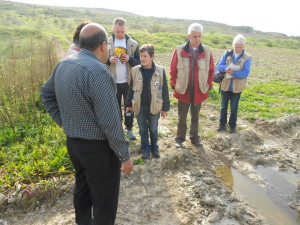Sebastiya: how Palestine’s trees are being poisoned West Bank Diary
New in Ceasefire, West Bank Diary - Posted on Friday, February 15, 2013 19:28 - 2 Comments
By Derek Oakley
The green ploughed fields of Sebastiya remind me of rural Witchampton, in my native Dorset, on the South Westcoast of England; something in the lie of the land, the texture of the soil, the mid afternoon Sunday sun, awakens a certain nostalgia for the village where I used to go every Sunday to visit my grandparents.
Predominantly known as a tourist site, Sebastiya, on the West Bank, which sits just outside the city of Nablus, is home to an impressive set of ruins and buildings, including some from the historic Jewish city of Samaria, stretching back through the Crusader period to Roman times and is most famously home to the tomb of John the Baptist, which sits next to a Mosque in the village centre. These are attractions that Witchampton, for all its charm, cannot lay claim to.
There are other, less pleasant features that the two places do not share, and this is the prime reason for my visit. A sewage pipe from the neighbouring settlement of Shavei Shomron is releasing waste water into the land of local farmers.
Shavei Shomron was built on land occupied in 1977 by the messianic Jewish movement Gush Emunium. These settlers believe that Israeli victory in the 1967 war was a sign of divine redemption, and view the settler movement as the return of the Jewish people to their biblical homeland. The settlement has three factories, processing and producing aluminium, leather and plastics. It is believed that the grey fluid pumping out into the Olive Groves of Sebastiya is industrial sewage coming directly from these factories.
Around 600 dunumns (square kilometres) of land are estimated by local farmers to be affected by the leak. It was first noticed around 3 years ago. In early January it turned from an occasional trickle to a constant flow, increasing late at night and early in the mornings. Following the stream of water back to its source at the tall wire fence separating Sebastiya and Shavei Shomron, one is immediately struck by the noxious odour that it emits and the evident difference in the grass and trees in its vicinity. They are dead or dying, turned a metallic grey by contact with the waste.
We spoke to local farmer Ahmed Kayed, who has 12 dunumns of land covered with olive trees. The pollution is the latest of number of ways in which the settlement and its inhabitants have affected his livelihood; in 2006, 200 of his trees were cut down by settlers. Pigs are also released on a regular basis from the settlement into his fields, causing damage.
Ahmed says that he and his friends are scared to harvest even from trees far from the stream for fear that the ground water their roots feed on will have been contaminated. Without their olive harvest, they will make very little money this year. He continued “They (the settlers) are saying that God gave them this land. Did God give the message to kill the trees?”
Sebastiya is not alone amongst Palestinian villages in its plight. Water pollution and contamination of ground water are the major environmental issues that Palestinians face and they are both linked directly to the occupation and the settlements. According to Article 56 of the 4th Geneva Convention, Israel, as an occupying power, has the duty of
“ensuring and maintaining, with the cooperation of national and local authorities… public health and hygiene in the occupied territory” in order to prevent the spread of diseases and epidemics.”
Most Palestinian communities have not been provided with, or allowed to build, sufficient waste water facilities to deal with their own sewage since 1967. Under the Oslo Accords a joint Israeli-Palestinian Water committee was formed. However, while on the surface this implies cooperation for mutual gain, the reality is different. As a recent article based on research by the University of Sussex states ‘policy coordination’ should not be mistaken for ‘cooperation’, obscuring the reality of Israeli domination within the West Bank that continue to this day. This is addressed by the Friends of the Earth Middle East, who have devised a proposal for an alternate Israeli-Palestinian Water Accord.
Settlements creating both residential and industrial waste have expanded since Oslo, many without suitable waste water facilities. None of the ‘outposts’ considered illegal under Israeli law have such facilities and both Settlements and outposts regularly discharge both waste water and solid waste into adjacent areas.
In January, the UN Human Rights Council met for its periodic review of Israeli observation of human rights standards. This is a regular process that all UN member states go through approximately once every two years. Prior to the meeting the advance copy of a new UN report on Settlements and their legality was released. Israel made history by being the first state ever to boycott the meeting in protest at alleged bias of the Council against it.
The report extensively details violations of international humanitarian and human rights law related to the settlements. Amongst these, in the section noted ‘Impact of Business’, the report notes that:
“Business enterprises have enabled, facilitated and profited directly and indirectly from the construction and growth of the settlements”
And these activities have raised serious concerns about Human Rights violations including “the use of natural resources, in particular land and water, for business purposes” and “Pollution, dumping and transfer of waste to Palestinian villages”.
The report makes the following recommendations (amongst others)
“Israel must, in compliance with article 49 of the Fourth Geneva Conventions, cease all settlement activities without preconditions. In addition it must immediately initiate a withdrawal of all settlers from the OPT…
The mission calls upon all Member states to comply with their obligations under international law and to assume their responsibilities in their relationship to a state breaching peremptory norms of international law-specifically an unlawful situation resulting from Israel’s violations”
As noted in the recent report ‘Trading Away Peace’ EU states, including the UK, participate in trade worth millions of pounds with Israel every year, trade that includes the import of hundreds of thousands of pounds worth of produce from illegal settlements, which may be misleadingly labelled ‘produce of Israel’. Retailers Tesco and Argos, and recently Sainsburys and Morrisons, have all been implicated in this trade.
The factories in settlements all across the West Bank that are processing and packaging these imported goods are the same ones polluting West Bank villages and undermining the Palestinian economy. The poisoned olive trees of Sebastiya will be on my mind next time I go to a supermarket back in the UK.
The Quakers, who coordinate the EAPPI programme in the UK and EIRE call for an end to trade with settlements.
To find out more about how you can join this campaign and help stop the EU sustaining the settlements visit this website.
2 Comments
GPJA #456 (Part 2/2): International news and analysis | GPJA's Blog
Yam Erez
Interesting how Judge Yosef Alon remarked, after an illegal settlement in the Negev was evacuated for allegedly causing environmental damage, “public lands are not up for grabs for anyone who wants to take possession of them.” I suppose this only applies in Israel proper, hmmm?





[…] West Bank Diary | Sebastiya: how Palestine’s trees are being poisoned https://ceasefiremagazine.co.uk/west-bank-diary-sebastiya/ […]